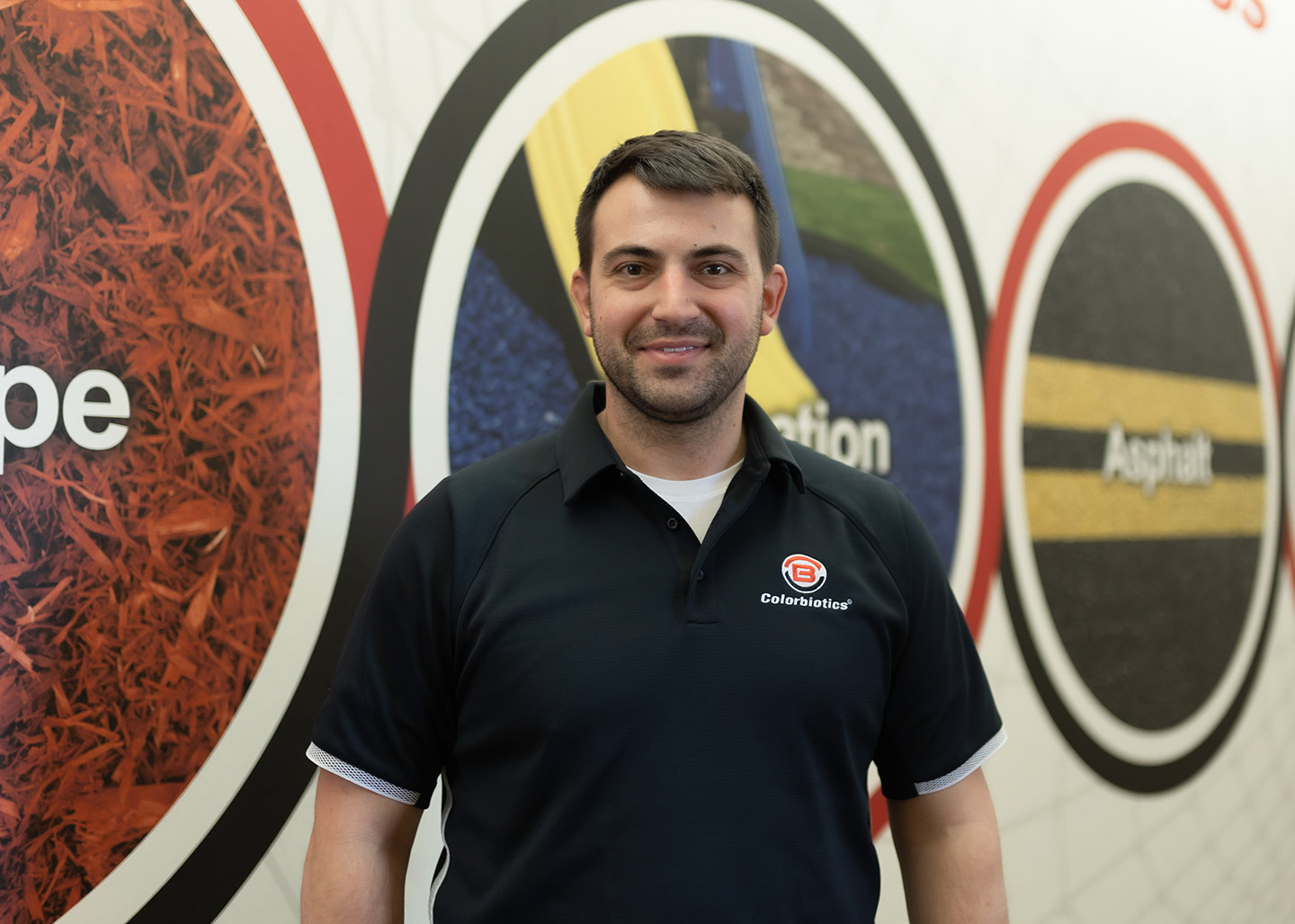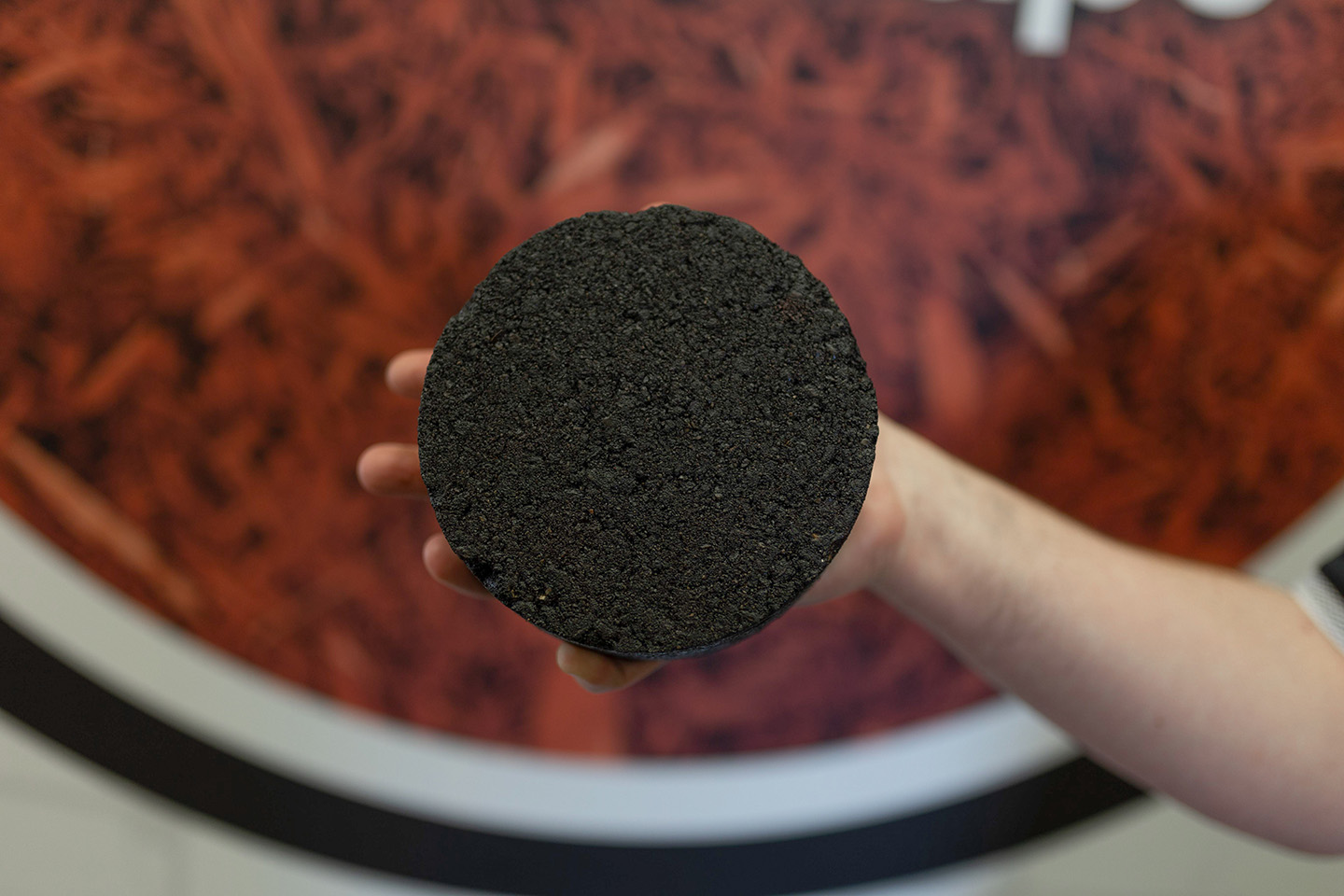
(Photo: Joclyn Bushman/Iowa Soybean Association)
New uses for soybeans go way beyond the fields
May 26, 2022 | Kriss Nelson
Technology developed at Iowa State University is hitting the streets – literally – through an Ames-based company. Midwest-grown soybeans are important pieces in the production and application of this technology and the products created.
Colorbiotics recently announced the availability of paving and roof protectant products utilizing soy.
The products, made using a biopolymer created from soy oil, include asphalt hot mix applications, topical spray applied applications and a roof shingle maintenance product.
In addition to the biopolymer asphalt products, Colorbiotics manufactures landscape colorant, recreation surfaces and the equipment used to make those products.
The Iowa Soybean Association’s (ISA) Soy Squad recently toured Colorbiotics to see how soy is used in these off-farm applications.
“The asphalt products produced by Colorbiotics benefit much of the population by making sustainable and economic-friendly products,” says Nathan Behrends, an ISA Soy Squad participant from Wiota.
Why soy oil?
One bushel of soybeans equals 11 pounds of soy oil. Approximately 11.3 pounds of soy oil are used for Invigorate Rejuvenator. BioMag utilizes 11.6 pounds of soy oil.
“We can use raw material grown right here in the Midwest,” says Kent Chandler, business development manager for asphalt products for Colorbiotics. “We don’t have to make it and it’s not toxic or creating toxic waste.”
The process of recycling asphalt involves grinding the old pavement and putting it back together using binders. Binders made using biopolymer, made with a renewable product like soy, far exceed the performance of a petroleum-based binder, says Austin Hohmann, product manager for Colorbiotics.
Eric Cochran, the Mary Jane Skogen Hagenson & Randy L. Hagenson Professor in the Department of Chemical and Biological Engineering at Iowa State University (ISU), has been working on the formulation and processes associated with creating these alternatives to petroleum-based asphalt products for more than 10 years.
Though many products have been created using soy oil, work continues on technology development with the new polymers.
“I think it is exciting we can grow something locally in Iowa that has nationwide reach to improve infrastructure and reduce environmental impact,” says Cochran.

Standing the test of time
The asphalt products are currently undergoing testing at the National Center for Asphalt Technology (NCAT) test track at Auburn University.
So far, the biopolymer asphalt has undergone 40 years of simulated use and is not showing signs of distress or rutting.
Rolland Schnell, a past ISA president, saw firsthand how soy was performing when he visited the NCAT test track in 2020.
“It is performing beautifully,” he says. “They were raving about its durability; it’s quieter and has a smoother ride.”
Future ready
Schnell hopes the use of this biopolymer technology is just the start of advanced soy usage.
“I believe new uses for our soybeans will be created that we cannot begin to imagine,” he says. “The soybean is so versatile beyond food and fuel that our imagination may be the only thing holding it back.”
Behrends finds the future is promising thanks to companies and ISU working to create soy-based products.
“Soy-based products continue to be at the forefront of making the world more sustainable,” he says. “Thanks to research and development done by companies like Colorbiotics, soybeans have a bright future.”
Hot mix applications
Invigorate Rejuvenator
Invigorate Rejuvenator increases the use of Reclaimed Asphalt Pavement (RAP) or Reclaimed Asphalt Shingle (RAS) by extending the asphalt’s service life.
Biomag Poly/RAP
Biomag Poly/RAP is for hot/ warm mix contractors who want to increase RAP/RAS usage while also reducing the amount of polymer needed in the mix design to achieve a Polymer Modified Asphalt Cement for high-performance, high-volume pavements, such as roads.
Topical spray applied applications
Invigorate Revive SA
Used on pavements, roads and parking lots to revive aging asphalt without having a “sealing” effect present with polymer sealants.
Projects with a budget-conscious focus could benefit from using Invigorate Revive SA.
Biomag Fog + Fix
Biomag Fog + Fix is for situations where asphalt pavement requires the penetrating properties of Invigorate Revive SA with the sealing capability of polymers. This sealant helps to reduce water permeability through roads or pavement by 40% to 80%.
Roof shingle maintenance
Peak 301
Peak 301 is a spray-applied product that drives deep into the asphalt shingle, reversing the aging process caused by constant sun exposure and weather cycling, which extends the life of a homeowner’s asphalt shingle roof.
Back